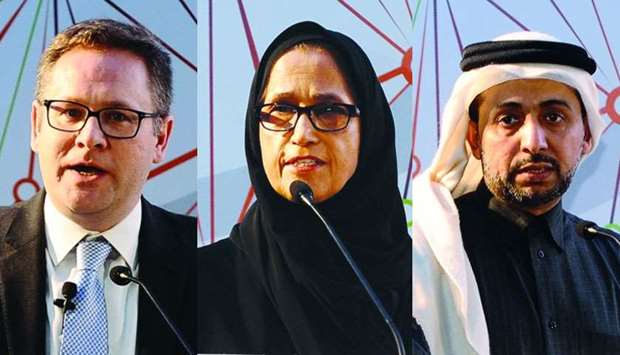Higher education institutions and emerging economies need to share integrated, long-term strategies for education, and to make higher education “much more flexible” and capitalise on “the opportunities offered by technology,” Qatar’s former ICT minister has said.
In her keynote speech on Tuesday at the Times Higher Education (THE) Emerging Economies Summit hosted by Qatar University (QU), former Minister of Information and Communications Technology Dr Hessa al-Jaber called on higher education institutions to take several actions to improve student experience and the quality of education.
The summit is being held under the theme "Building University Impact Through Resilience and Innovation".
According to al-Jaber, these institutions should go through a fundamental business transformation; have the ability to adapt to fast-moving trends, and opportunities; to become digitised and digitally-enabled; analyse data; and share with emerging economies integrated, long-term strategies for education.
“Redesigning higher education is more than just new technologies. Technology is changing the landscape of higher education. Academic institutions could take advantage of new technological advances, but this is not enough,” al-Jaber said.
The opening session of the summit was attended by HE the Prime Minister and Minister of Interior Sheikh Abdullah bin Nasser bin Khalifa al-Thani at QU's Ibn Khaldun Hall on Tuesday morning.
He was briefed on the objectives of the summit, which seeks to exchange experiences in building and developing knowledge economies that will benefit the societies of emerging and developing countries, in addition to a speech on the importance of the summit in promoting quality in the field of education, innovation, scientific research and knowledge exchange, as well as the challenges facing institutions in developing countries and how industry partnerships contribute to preparing students to join the labour market, QNA reported.
The session was attended by a number of ministers, officials, dignitaries, researchers, specialists in the field of higher education and guests of the summit.
QU president Dr Hassan al-Derham said the conference shows Qatar’s “confident progression towards the advancement and development in all areas”.
He said education “is the start of any renaissance” and stressed that the summit organised by QU in partnership with THE “is primarily aimed at measuring the impact that universities and higher education institutions play in the renaissance of societies of the summits participating countries.”
Dr al-Derham said the presence of more than 35 university presidents, 240 participants and 110 speakers confirms the strength and importance of the summit in shaping educational and economic policies in emerging countries and the importance of innovation, which allows universities to be the principle tool to solve future issues.
He said global classification of universities has become a vital indicator for the measure of scientific research provided by universities.
“While rankings are not the goal, they can be a strategic indicator of what universities offer. Qatar University, which offers its service to Qatar’s community, seeks to be categorised high in world rankings in order to best serve its society,” he said.
In his speech, THE chief knowledge officer Phil Baty stressed the summit’s importance in shaping future policies for higher education “so that universities have a profound impact and a proven role in supporting the economies of countries at local levels in order to make a better world in the future.”
“This summit will determine the impact of universities through flexibility and innovation so that researchers and the public can see what universities offer, their value, and vital role in building societies,” Baty said.
Despite the ongoing economic blockade, Baty assured the audience of Qatar’s “ability to do more to benefit people, as this summit will make the universities more flexible and more changeable for the better.”
In a statement, QU said the conference will conclude today with the announcement of the results of the world rankings of
the Times Foundation for Higher Education for the year 2019.
QU said it is "moving forward with achievements at the global rankings level, maintaining its position among the top 500 universities in the world at the THE World University Rankings".
QU also continues to be ranked number one in the International Outlook indicator in the overall Times Higher Education World University Rankings list for the fourth time in a row.


